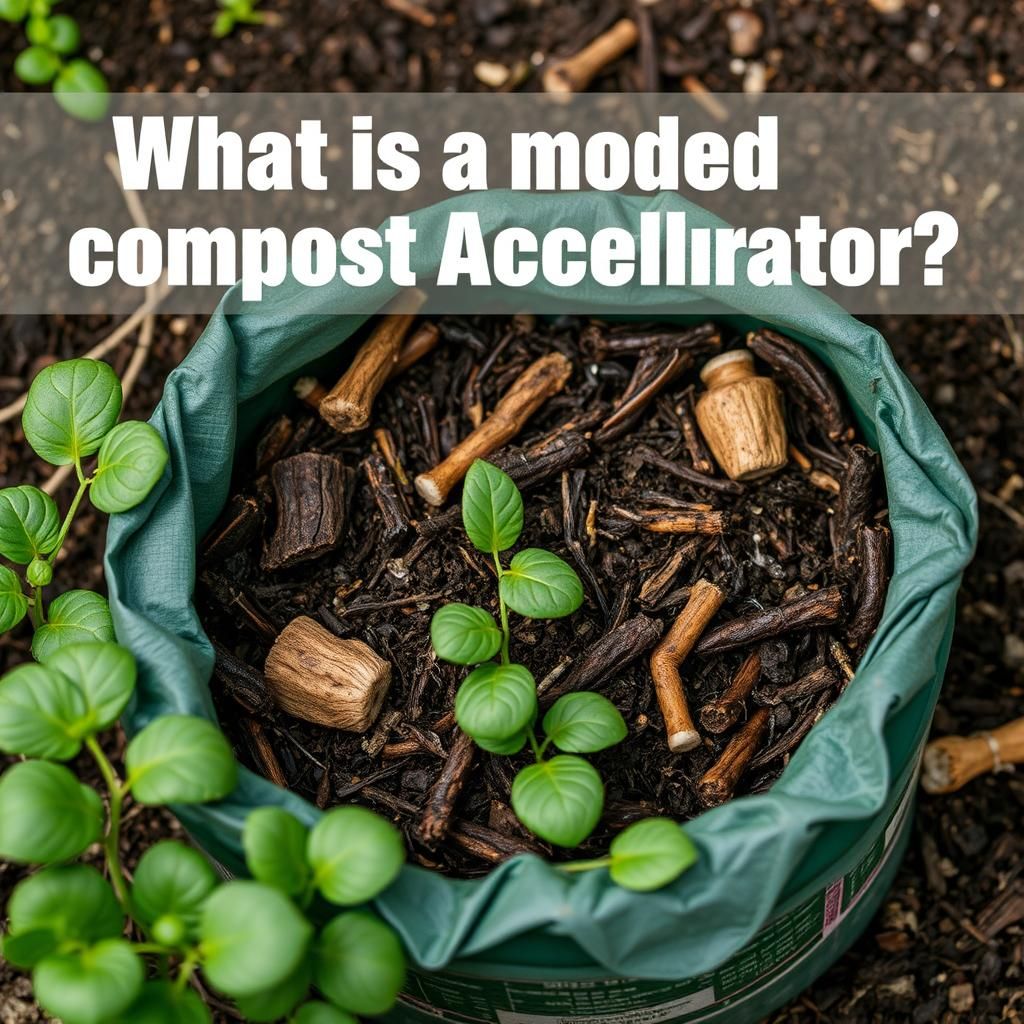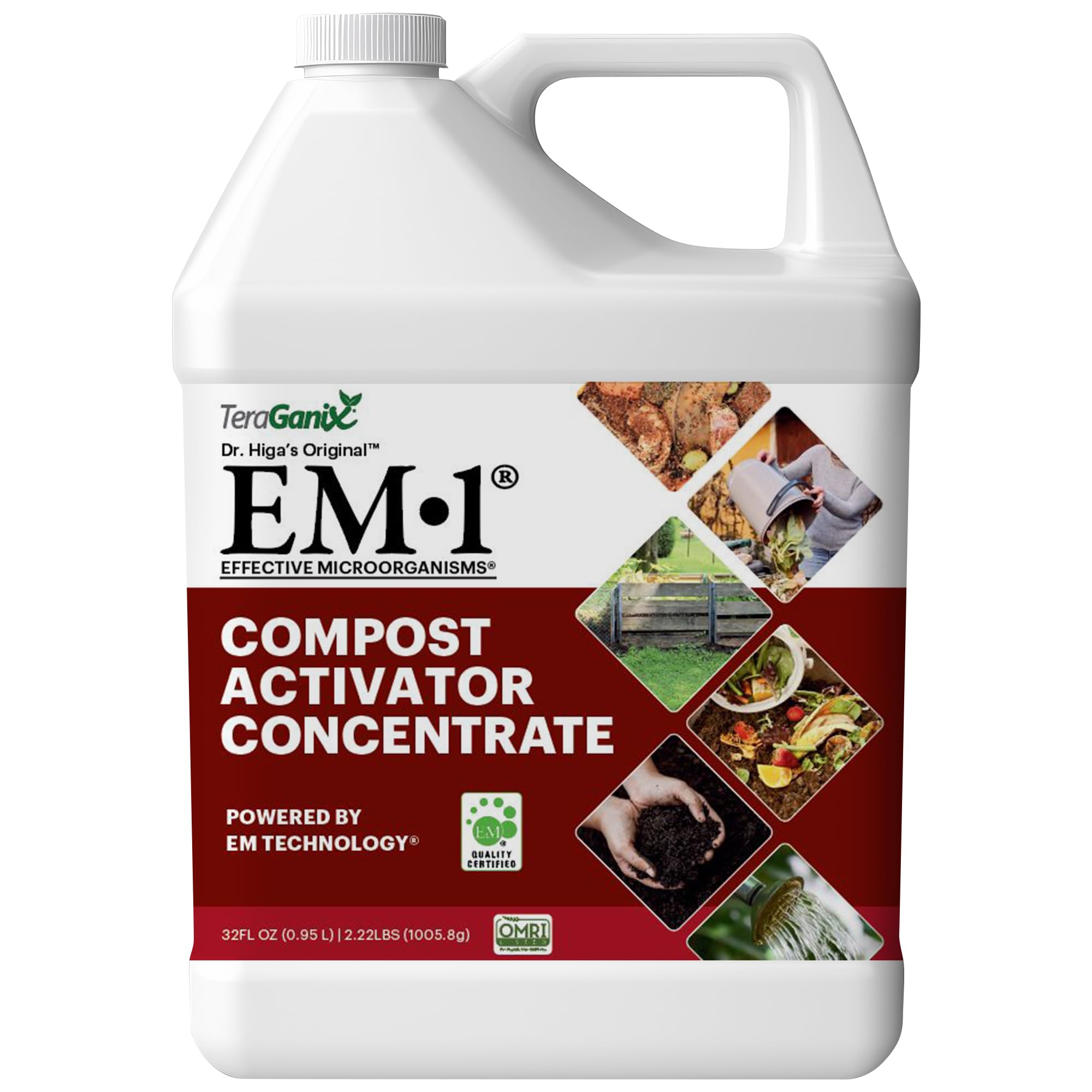What is a good compost accelerator? Discover Effective Options for Faster Composting

Composting is an essential practice for sustainable living, transforming kitchen scraps and yard waste into nutrient-rich soil. However, the process can sometimes feel slow, leaving many gardeners wondering how to speed things up. A compost accelerator may be the solution, boosting microbial activity and enhancing decomposition. In this article, we will explore what a good compost accelerator is and review effective options to help you achieve faster composting. From natural ingredients to store-bought solutions, discover the best ways to enhance your compost pile's efficiency and maximize its potential for enriching your garden soil.
What is a Good Compost Accelerator?
A good compost accelerator is a substance that enhances the decomposition process in your compost pile, helping it break down organic materials more efficiently. These accelerators introduce beneficial microorganisms and nutrients that speed up the breakdown of carbon-rich (browns) and nitrogen-rich (greens) materials, ultimately facilitating a faster transformation into nutrient-rich compost. Common accelerators include commercial products, manure, coffee grounds, and even garden soil. By using a compost accelerator, gardeners can achieve higher-quality compost in a shorter time, making it an effective tool for sustainable gardening practices.
How Compost Accelerators Work
Compost accelerators work by introducing a high concentration of microorganisms, essential for breaking down organic matter. These microorganisms, including bacteria and fungi, thrive in moist and nutrient-rich conditions provided by the accelerators. As they multiply, they metabolize the organic materials, leading to increased heat generation in the compost pile, which further accelerates the decomposition process. This biological activity results in a faster breakdown of materials compared to a compost pile that relies solely on natural processes.
Types of Compost Accelerators
There are several types of compost accelerators, each offering unique benefits. For instance, commercial compost starters often contain a blend of essential nutrients and microorganisms specifically formulated for optimal composting. Manure is rich in nitrogen and helps activate decomposition, while coffee grounds add nitrogen and help improve moisture retention. Even garden soil can be effective, as it brings a diverse range of microorganisms that support composting efforts. Each type has its own characteristics, making it possible to choose the best one based on the specific needs of your compost pile.
Benefits of Using a Compost Accelerator
The primary benefit of using a compost accelerator is the reduction in composting time, turning kitchen scraps and yard waste into finished compost more quickly. This quicker process also minimizes the odor associated with decaying organic materials and helps maintain a balanced moisture level. Additionally, an accelerator can enhance the nutritional content of the compost, offering more nutrients for your garden plants compared to using organic waste alone. Overall, incorporating an accelerator into your composting routine can significantly improve both the efficiency and quality of the end product.
How to Use a Compost Accelerator
To use a compost accelerator effectively, first, ensure your compost pile is balanced with the right ratio of browns and greens. Then, follow the instructions provided with your chosen accelerator, as each product may vary in application methods. Generally, you can sprinkle the accelerator over the compost materials as you layer them or mix it into the pile. Maintaining adequate moisture in the compost is also crucial, so make sure to water the pile sufficiently. Regular turning of the compost will further help to incorporate the accelerator and promote even decomposition.
Common Misconceptions About Compost Accelerators
Many people believe that compost accelerators are a magic solution that guarantees quick compost without the need for proper maintenance. However, while these products can significantly speed up the process, they do not replace the need for regular turning, moisture management, and balancing carbon and nitrogen levels in the compost. Additionally, some gardeners think that more accelerator equals faster results, but using excessive amounts can actually disrupt the microbial balance and slow down decomposition. Understanding the purpose and proper use of compost accelerators is crucial for successful composting.
| Type | Benefits | Usage |
|---|---|---|
| Commercial Products | Quick decomposition, balanced nutrients | Sprinkle as per instructions |
| Manure | Rich in nitrogen, enhances microbial activity | Add in layers or mix |
| Coffee Grounds | Provides nitrogen, improves moisture retention | Mix throughout the compost |
| Garden Soil | Diverse microorganisms, boosts decomposition | Add a thin layer throughout |
What is the best activator for composting?

The best activator for composting is often a rich source of nitrogen, which is necessary to kickstart the decomposition process. While there are many options available, some of the most effective compost activators include grass clippings, manure, and commercial compost starters. These materials help provide the essential nutrients that microorganisms need to break down organic matter efficiently.
What are the Most Effective Nitrogen Sources?
One of the key components for successful composting is nitrogen. Nitrogen-rich materials provide the necessary nutrients for bacteria and other microorganisms that drive the composting process. Here are some effective nitrogen sources:
- Grass clippings: Freshly cut grass is high in nitrogen and helps maintain a balanced green-to-brown ratio.
- Animal manure: Manure from herbivores like cows, horses, and chickens is an excellent source of nitrogen, but it should be well-aged to avoid pathogens.
- Kitchen scraps: Vegetable scraps, coffee grounds, and eggshells are rich in nitrogen and can significantly enhance compost quality.
Why is Carbon Important in Composting?
While nitrogen is crucial, carbon is equally important in the composting process. Carbon materials, or browns, provide energy for the microorganisms. A proper balance between nitrogen (greens) and carbon (browns) is essential for effective composting.
- Dried leaves: They are an excellent source of carbon and help balance the nitrogen-rich greens.
- Straw or hay: Both materials are effective carbon sources that improve aeration in the compost pile.
- Wood chips: These are high in carbon and can improve the structure of the compost.
Commercial Compost Activators: Are They Worth It?
Many gardeners opt for commercial compost activators, which are designed to accelerate the composting process. These products typically contain a mix of natural ingredients aimed at enriching compost.
- Microbial cultures: They introduce beneficial microorganisms that enhance the breakdown of organic matter.
- Enzymes: They help speed up the decomposition process, making it quicker and more efficient.
- Trace elements: Some activators include minerals and nutrients to support microbial activity.
How to Use Kitchen Scraps Effectively?
Using kitchen scraps can greatly contribute to composting, but it requires attention to detail to avoid odor and pest issues. Proper usage involves:
- Chopping scraps: Cutting them into smaller pieces accelerates decomposition.
- Avoiding meat and dairy: These can attract pests and create odors, disrupting the composting process.
- Layering scraps: Mixing them with browns, like leaves or cardboard, helps maintain the right carbon-to-nitrogen ratio.
Tips for Maintaining a Successful Compost Pile
To ensure the compost pile stays healthy and productive, certain practices should be followed:
- Aeration: Regularly turning the pile provides oxygen for microbes, promoting faster decomposition.
- Moisture control: Keeping the pile moist but not soggy is critical; it should feel like a wrung-out sponge.
- Temperature monitoring: A hot compost pile (130-160°F) indicates active decomposition; if it cools down, it may need more nitrogen or aeration.
How to make your own compost accelerator?

To make your own compost accelerator, you will need to create a mix of ingredients that will help speed up the decomposition process of organic materials. A compost accelerator generally provides additional nutrients or stimulates the growth of microorganisms that break down organic matter more efficiently. Here’s a simple way to do it:
Ingredients Needed
See also:
1. Nitrogen Source: This can be fresh grass clippings, kitchen scraps (like fruits and vegetables), or manure.
2. Brown Material: This includes dried leaves, cardboard, or straw that provides carbon.
3. Water: Essential for maintaining moisture levels in the compost pile.
4. Aeration: To help oxygen circulate, which is needed for aerobic decomposition, you can use wood chips or small branches.
Mixing the Ingredients
1. Start by gathering your brown materials.
2. Add an equal amount of green materials or nitrogen sources.
3. Moisten the mixture lightly with water—aim for about 40-60% moisture content.
4. Turn the compost pile regularly to ensure aeration.
Proportions for Maximum Effectiveness
To achieve the best results, the typical ratio for your compost accelerator should be:
- Carbon to Nitrogen Ratio: 30:1 is ideal.
- Moisture Level: Keep the materials damp, not soggy.
- Aeration Frequency: Turn your compost every 1-2 weeks.
Choosing Microbial Activators
Another way to enhance your compost accelerator is to introduce beneficial microbes. Here are some options:
- Store-Bought Inoculants: These can be purchased from gardening stores.
- Molasses: A tablespoon per gallon of water will feed microbes.
- Compost Tea: Made by soaking aged compost in water for a day.
Timing and Conditions
Your compost accelerator's effectiveness will depend on various factors:
- Temperature: The ideal composting temperature is between 130°F to 160°F (54°C to 71°C).
- Moisture Content: Regularly check to prevent drying out.
- Particle Size: Smaller pieces decompose faster, so chop materials as necessary.
Signs of Successful Activation
You will know your compost accelerator is working based on these indicators:
- Heat Generation: A well-active compost pile will generate heat.
- Breakdown of Materials: Materials should break down noticeably within weeks.
- Earthy Smell: The presence of a pleasant earthy smell indicates healthy microbial activity.
What turns into compost the fastest?

Composting is a natural process that transforms organic matter into nutrient-rich soil. The speed at which materials break down into compost largely depends on their composition, moisture, aeration, and the presence of microorganisms. Here are some of the fastest composting materials:
1. Grass Clippings: These are often considered one of the fastest composting materials. They are high in nitrogen and break down quickly due to their smaller particle size, which increases the surface area for microorganisms.
2. Fruit and Vegetable Scraps: Fresh kitchen scraps, like peels and cores, decompose rapidly. Their high moisture content and nutrient levels help accelerate the composting process.
3. Coffee Grounds: Rich in nitrogen, coffee grounds are a readily available resource that decomposes quickly. They can help improve the texture of the compost as well.
4. Eggshells: While they take a bit longer to break down compared to other food scraps, crushing them into small pieces helps speed up their composting. They provide essential minerals like calcium.
See also:
5. Small Branches and Twigs: When shredded or chipped, these can become compost very quickly. They add carbon to the mix and improve aeration when mixed with softer materials.
Grass Clippings
Grass clippings are an excellent addition to a compost pile due to their high nitrogen content. They are readily available in many homes, especially during the mowing season. To ensure they compost quickly:
- Keep clippings thin to avoid clumping.
- Mix with brown materials like leaves to balance carbon and nitrogen.
- Turn the pile regularly to aerate and speed up decomposition.
Fruit and Vegetable Scraps
Kitchen scraps, particularly from fruits and vegetables, are rich in nutrients and moisture, allowing them to break down quickly. They add essential organic matter to the compost. To enhance their composting speed:
- Cut scraps into smaller pieces to increase surface area.
- Avoid adding spoiled food to prevent odors and pests.
- Mix with dry leaves or sawdust to balance moisture levels.
Coffee Grounds
Coffee grounds are often overlooked as compost material but are rich in nitrogen and beneficial microorganisms. They break down quickly and can enhance the compost's structure. To utilize coffee grounds effectively:
- Mix coffee grounds throughout the compost pile for even distribution.
- Combine with other green materials like fruit scraps for balance.
- Limit added grounds to avoid acidity in the compost mix.
Eggshells
Eggshells can take longer to decompose if left whole, but when crushed, they provide valuable calcium and improve soil health. Steps to include eggshells efficiently include:
- Rinse eggshells to clean them and avoid odors.
- Crush or grind them before adding to speed up composting.
- Mix with other greens to maintain an optimal pH level.
Small Branches and Twigs
While larger woody materials take longer to compost, shredding or chipping small branches and twigs can significantly speed up the process. They serve as a carbon source and help aerate the compost pile. To compost them quickly:
- Chop branches into small pieces before adding.
- Balance with high-nitrogen materials for efficient breakdown.
- Mix throughout the pile to help with aeration.
How can I accelerate my compost?

To accelerate your compost, several strategies can be implemented to enhance the decomposition process. Here are effective methods to speed up composting:
Understanding the Composting Process
The composting process involves microorganisms breaking down organic matter into nutrient-rich soil amendment. To accelerate this process, it is essential to ensure a balance of nitrogen-rich materials (greens) and carbon-rich materials (browns). Maintaining the proper moisture level, aeration, and temperature will help promote the microbial activity that drives decomposition.
- Greens: Fresh grass clippings, fruit scraps, and vegetable peels
- Browns: Dried leaves, straw, and cardboard
- Moisture: Keep your compost pile damp, like a wrung-out sponge
Maintaining Proper Aeration
Aeration is crucial for speeding up decomposition. Turning the compost pile regularly exposes the materials to oxygen, which is needed by aerobic microorganisms. A well-aerated compost pile can decompose faster and smell better.
- Frequency: Turn your compost pile every two weeks.
- Tools: Use a pitchfork or compost aerator to mix materials.
- Structure: Consider building your compost pile in a bin with slats for airflow.
Using Smaller Materials
Cutting or shredding compost materials into smaller pieces increases their surface area, making it easier for microorganisms to break them down. This simple adjustment can significantly quicken the composting process.
- Shredding: Use a garden shredder for branches and leaves.
- Chopping: Cut kitchen scraps into smaller bits before adding them.
- Grinding: Consider using a blender for tougher materials like eggshells.
Adding Compost Activators
Compost activators are materials rich in nitrogen that can jump-start the decomposition process. By incorporating these activators, you can feed the microorganisms and help create heat, which speeds up composting.
- Blood meal: A fast-acting nitrogen source.
- Compost starter: Commercial products designed for quick composting.
- Manure: Well-aged animal manure is an excellent activator.
Monitoring Temperature and Moisture
Keeping an eye on the temperature and moisture levels in your compost pile is essential for maximizing microbial activity. A well-maintained compost will reach higher temperatures, which can kill pathogens and pests while encouraging efficient breakdown.
- Temperature: Aim for a range between 130°F and 160°F (54°C - 71°C).
- Moisture: Adjust water levels to achieve optimal moisture content.
- Thermometers: Use a compost thermometer to monitor heat levels.
Questions from Our Readers
What is a good compost accelerator?
A good compost accelerator is a substance that speeds up the composting process by providing the necessary nutrients and microorganisms to break down organic materials more efficiently. Common options include commercial compost starters, manure, and green plant materials that are rich in nitrogen.
How do I use a compost accelerator?
To use a compost accelerator, simply mix it into your compost pile or bin along with the organic materials. Follow the instructions on the product label for the best results, as different accelerators may have varying application rates and methods for optimal effectiveness.
Can I make my own compost accelerator at home?
Yes, you can make your own compost accelerator using kitchen scraps like fruit peels, vegetable trimmings, or even coffee grounds. Additionally, adding materials high in nitrogen, such as grass clippings or yard waste, can effectively boost the composting process.
How long does it take for a compost accelerator to work?
The time it takes for a compost accelerator to work can vary, but typically, you should start seeing results within a few days to a week after application. Factors such as temperature, moisture, and the type of materials being composted will also influence how quickly the composting process occurs.
See also:

If you want to read more articles like What is a good compost accelerator? Discover Effective Options for Faster Composting, we recommend you check out our Compost category.
Leave a Reply
Related Articles